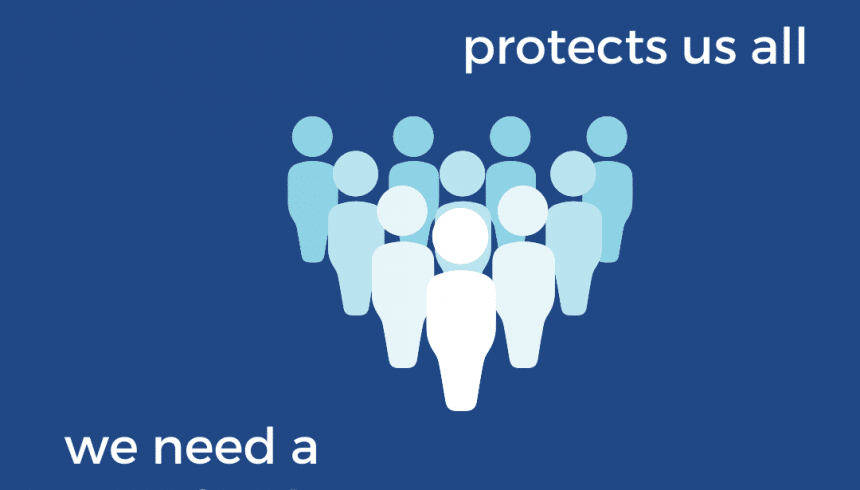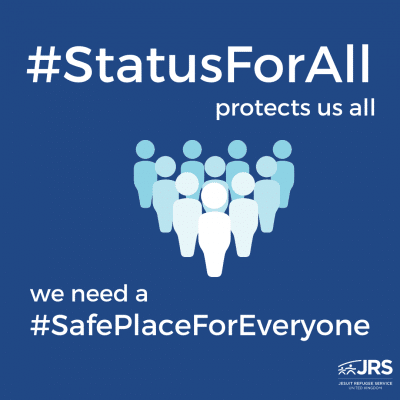JRS UK has written to the Prime Minister calling for a grant of a period of ‘leave to remain’ to all those with insecure immigration status, to allow them to access accommodation, the health service and labour market. Over 30 front-line facing organisations working with asylum seekers, refugees, and those with irregular immigration status have co-signed the letter, which has also garnered public support from Auxiliary Bishop for Westminster Paul McAleenan and numerous Anglican Bishops.
On Friday 1st May JRS UK, along with dozens of other front-line organisations, wrote to Boris Johnson urging him to protect public health and the welfare of everyone in society by granting a period of ‘leave to remain’ to those awaiting decisions from the Home Office, those who have been refused asylum, and those who are undocumented. The number of signatories to the letter has since grown to 35.
A period of leave to remain is a vital step to protect public health during the COVID-19 pandemic. People with insecure immigration status face multiple barriers to accessing support, housing and healthcare. Many of them, who are or have been supported by the front-line organisations, experience homelessness and precarious housing situations, making social distancing and self-isolation impossible, and increasing vulnerability to infection. Allowing people to regularise their status, JRS UK and other organisations argue, is the most effective and comprehensive way of ensuring they get the support they need during this crisis, and thereby protecting UK society as a whole.
Sophie Cartwright, JRS Policy Officer said:
“It is vital that everyone can access the support they need during the pandemic, but again and again, we are seeing that lack of immigration status acts as a barrier. We work with people who have been refused asylum struggled in destitution for years. Now even more than ever, this needs to change. A grant of leave to remain includes people and strengthens our communities at a time when desperately need to come together.”
Auxiliary Bishop for Westminster and chair of the Catholic bishops’ office for migration policy, Paul McAleenan joined their call saying:
“I fully support the Jesuit Refugee Service and other charities in calling for a grant of leave to all with insecure immigration status during the current pandemic.
One’s human dignity is the primary issue. In this crisis respect for human dignity demands that everyone without exception is given the right to protect themselves from Covid-19 and to receive medical treatment if necessary.
We are constantly implored to protect ourselves and others for the Common Good of society. Those without permanent status should be given the opportunity and means to do so, to social distance, to self isolate, to access healthcare and so lessen the possibility of jeopardising public health.
We have seen elsewhere how a grant of leave can protect those who are vulnerable and limit the spread of the pandemic. I sincerely hope our own government will consider taking the recommended steps in response to the extraordinary circumstances we face.”
At a time when the public health emergency makes it essential for everyone to be able to access to safe accommodation and healthcare, insecure immigration status acts as a barrier and puts everyone’s health at risk.
People with insecure immigration status often live in complete destitution and rely on small hardship grants or food parcels from charities. Even in normal circumstances, this means they face a day to day struggle for survival, and at the moment, with many charities closed and with restrictions on movement, this is leaving many already vulnerable individuals in dire circumstances. We at JRS UK are hearing heartrending stories of homelessness, exploitation and hunger.
Helen (not her real name) has been refused asylum but granted asylum support due to the pandemic, but it is so slow, she is still waiting for her accommodation. The person with whom she has been staying with is constantly asking her to leave and she is feeling very stressed. She has completed recent studies in early years childcare and very much wants to take this forward and begin work but can neither continue to study because of restrictions as a refused asylum seeker, nor can she begin working because working is banned for people without immigration status.
Hamid (not his real name) has been sleeping rough behind a supermarket for over two weeks. He does not have a sleeping bag and has been sleeping on some cardboard. He is clearly feeling very low. He has been referred to Streetlink but not yet accommodated.
Kofi (not his real name) supported by us has grown more desperate since the lockdown. His previous housing and support is no longer in place following a relationship breakdown and he has been isolating in a friend’s house. Although he has a place to stay, (making him luckier than many of those we support) his friend often leaves him alone in the house with no food or support, often resorting to going to sleep on an empty stomach. Again, having leave to remain and being able to support himself and make a contribution would mean everything to him.
Another woman, Sarah (not her real name) who has been supported by co-signatory of the letter Women for Refugee Women, has stayed in various places in London ever since her asylum claim was refused and she became destitute. When they spoke with her on 14 April, she had no money, no food, and nowhere to stay. Even though WRW involved other organisations, including large charities, Sarah’s local authority, and homelessness services, there was simply no immediate pathway into safe accommodation for Sarah. Hotels and hostels were full or had put in place strict criteria that meant they were unable to take her even the charity offered to pay for her stay, and she ended up sleeping outside on a night bus and then in a London park for two nights.
The welfare of those with irregular immigration status, such as Helen, Hamid, Kofi and Sarah, is tightly bound with the welfare of all in society. Without the right to work or access to mainstream benefits, people with insecure immigration status live in destitution. No Recourse to Public Funds (NRPF) rules have often prevented local councils from accessing funding to accommodate and support people. Furthermore, the ‘hostile environment’ policies and the Government’s focus on immigration enforcement, create a fear and reluctance among many to make themselves known to local authorities, while NHS charging and data-sharing between the Home Office and the Department of Health and Social Care can deter migrants from accessing healthcare. Difficulty accessing healthcare in turn leads to health problems becoming more severe and an increased risk to the wider public as well as individuals themselves.
Michael Tarnoky, JRS UK Legal Officer said:
“The threat to our society from the pandemic is going to stay with us even as lockdown eases. The more people are isolated from treatment, testing and tracking the harder it will be to overcome the public health challenges. The more people who have a lot to offer our society are allowed to contribute the stronger our recovery will be. A grant of leave would be a practical contribution to helping us leave this crisis behind as swiftly as possible.”
A grant of ‘leave to remain’ is the most effective way of ensuring people can access support they need during this crisis, and thereby protecting society as a whole.
It is also the quickest way to ensure all are able to contribute to the national effort, bringing many skilled workers back to support front line work, whether in hospitals, care, food distribution or cleaning.
Granting a period of leave to all also recognises the challenges for the Home Office in making decisions at a time when people will find it difficult to gather information necessary for evidence for their case and when neither lawyers nor Home Office are able to meet people face-to-face.
The Bishop of Bradwell, Dr John Perumbalath, has joined the call to the Prime Minister, saying:
“I support this call from migrant and refugee support organizations for granting a period of leave to remain to our brothers and sisters with insecure immigration status.
“They belong to one of the most vulnerable categories of people in this unprecedented lock down situation and urgent action is needed to protect them.
“We are talking about human beings many of whom have endured hardship, violence and hostility, whose immune systems have weakened due to poverty, poor diet and the stress of facing hostile systems and environment.
“NRPF conditions push these people into a dangerous situation of helplessness and leave them abandoned by the wider society.
“The best way forward is to offer them a period of leave to remain with access to public funds and the labour market. This will also enable them to contribute to the recovery and rebuilding of our economy.”
The Bishop of Croydon, Jonathan Clark also joined the call and said:
“I fully support the call for a period of leave to remain for those with insecure immigration status. This is important to allow these most vulnerable people the right to work, and to receive basic support, at any time and particularly now.
It is an issue of justice, and one of safety – justice for those who currently are disqualified from looking after themselves, and from receiving the help which our country offers to its other residents; safety both for them and for us all, as their situation leaves them vulnerable to infection themselves and therefore in danger of infecting others.
At a time when the government has demonstrated the capacity to invest huge sums in keeping our economy and society functioning, this is a simple and practical step, with huge positive benefits for us all.”
Sarah Teather, Director of JRS UK said:
“Granting temporary leave to all migrants during this emergency is a simple, efficient and effective way to protect public health and harness the skills of many for the national cause. We cannot afford to have trained nurses, doctors, care workers and other key workers barred from contributing to society when they are desperately needed.
“The wellbeing of every person matters, more now than ever before: anyone unable to access stable housing or basic provisions places themselves and potentially others in danger. We have to act. The quickest and easiest solution is to grant everyone with an outstanding immigration application immediate leave and the right to work, and to provide a fast route to regularise others, bringing them out of the shadows and into the workforce. It is the only way to protect public health, get help to those who need it and get everyone contributing what they can. Now is the time to work together and unite to save lives.”
You can read our letter to Boris Johnson in full here
Our letter has received significant media coverage so far. We were featured in The Observer, andThe Tablet , you can listen to JRS Director Sarah on the Sunday Program on BBC Radio 4 (18 min 53 secs), read her article in The Tablet and read an article published in the Independent from one of the members of our ’Refugees Call for Change’ self advocacy group.



